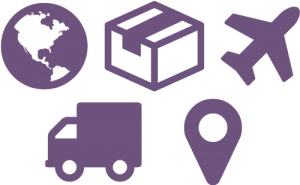About EXPORTA FÁCIL
Exporta Fácil
The use of the postal services platform with the aim of enhancing trade for South American MSMEs and promoting their insertion in the international market originates in the “Exports through Postal Services for MSMEs” project, implemented by the Brazilian Ministry of Communications in 1999, known as “Exporta Fácil.”
On a results basis, this project was selected in 2004 as one of IIRSA 31 and strategic priority projects. Since then, with the support of the Inter-American Development Bank (IDB), the Development Bank of Latin America (CAF), and the Financial Fund for the Development of the Plata Basin (FONPLATA), it has been implemented in five countries and work has been done with a view to its implementation in four others.
Peru was the first country to implement the project, with initial funding from the World Bank. The experience in Peru formed the basis for Brazil to develop the technical cooperation methodology that went on to be used in the other IIRSA member countries, with Exporta Fácil specifically tailoring its services to each country.
In 2007, the Multilateral Investment Fund (MIF) of the Inter-American Development Bank (IDB) approved a nonreimbursable operation to develop the project in Colombia, Ecuador, and Uruguay.
Exporta Fácil was launched in Peru in July 2007, in Uruguay in March 2009, in Colombia in December 2010, and in Ecuador in October 2011. Also, monitoring visits were made to Ecuador (2012) and Colombia (2013).
With the creation of the UNASUR South American Infrastructure and Planning Council (COSIPLAN) in 2009, IIRSA became the Council’s technical forum and, in 2011, COSIPLAN decided to broaden the concept of postal exports to “Trade Integration through Postal Services for MSMEs,” with the purpose of covering both incoming and outgoing foreign trade. This subject matter was incorporated into the COSIPLAN Strategic Action Plan (PAE) 2012-2022 and is currently part of the Council’s annual work plans.
WHY WORK ON TRADE INTEGRATION THROUGH POSTAL SERVICES?
The share of micro, small, and medium enterprises (MSMEs) in Latin American exports is much lower than in
developed countries (ECLAC-OECD, 2012). On the one hand, due to their size, MSMEs face major obstacles when participating in international trade, such as access to funding and information, high fixed costs of establishing and maintaining overseas trade networks, and constraints on management and technological capacity.
On the other hand, MSMEs’ exposure to the international market brings with it significant benefits, driving growth in productivity, competitiveness, and innovation, and enabling employment creation in competitive activities at an international level. These benefits justify the existence of specific support policies for this business sector. The use of the postal services platform with the aim of enhancing trade for South American MSMEs and promoting their insertion in the international market originates in the “Exports through Postal Services for MSMEs” project, implemented by the Brazilian Ministry of Communications in 1999, known as “Exporta Fácil.”
On a results basis, this project was selected in 2004 as one of IIRSA 31 and strategic priority projects. Since then, with the support of the Inter-American Development Bank (IDB), the Development Bank of Latin America (CAF), and the Financial Fund for the Development of the Plata Basin (FONPLATA), it has been implemented in five countries and work has been done with a view to its implementation in four others.
Peru was the first country to implement the project, with initial funding from the World Bank. The experience in Peru formed the basis for Brazil to develop the technical cooperation methodology that went on to be used in the other IIRSA member countries, with Exporta Fácil specifically tailoring its services to each country.


